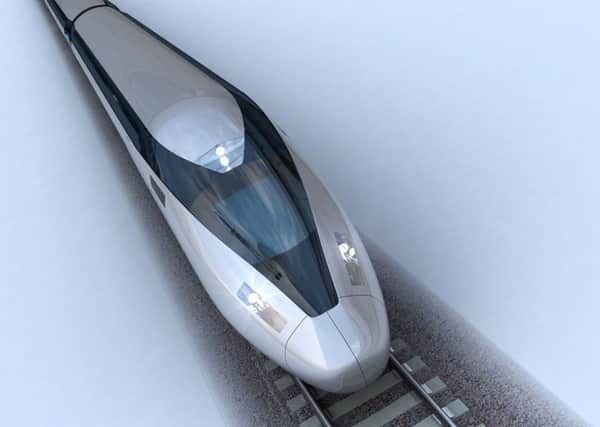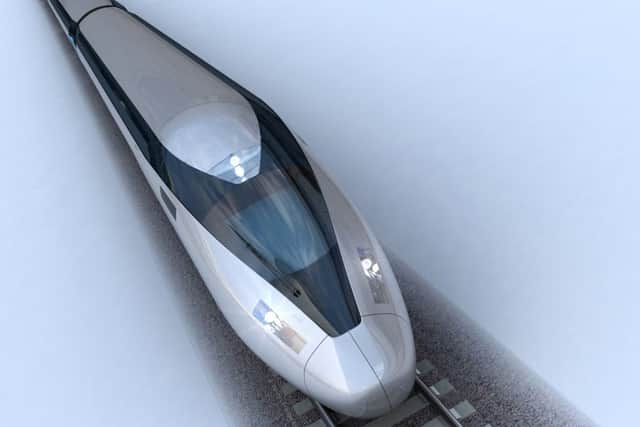Cameron says HS2 boss must cut scheme’s £50bn bill


The Prime Minister announced that Sir David Higgins, the new boss of the planned high speed rail link between London and the North, has been tasked with finding ways to cut the estimated £50 billion price of the scheme, to drive down costs and “make it affordable for our country”.
Speaking to the CBI’s annual conference in London, Mr Cameron dismissed as “nonsense” suggestions that there were other ways of cutting back the cost of modernising the railways, insisting HS2 was a “vital investment” which would ensure growing prosperity is not confined to the South of England but is shared with the North.
Advertisement
Hide AdAdvertisement
Hide AdThe scheme needs cross-party approval if it stands a chance of being built, but shadow chancellor Ed Balls threw Labour’s support into doubt by raising concerns about the spiralling costs earlier this year, insisting he would not sign a “blank cheque”.


In a clear swipe at Labour, Mr Cameron said: “To people who say there is some other cost-reduction plan we could also have, I say that is nonsense. I think with Sir David Higgins in charge, with the budget we have and the contingency we have, this is a good investment for Britain.
“People who are against it, in my view, are putting our country’s future at risk, they are putting the future of the North of England at risk. We need to have a concerted consensus across business, across politics, that we get behind these large infrastructure projects.”
And he added: “I think it is absolutely right to make this investment. It is going to unite our country, it will help drive economic growth, it will make sure our economy shares growth between the North and South, it will link eight of our 10 biggest cities.”
Advertisement
Hide AdAdvertisement
Hide AdHe rejected arguments that the cost of HS2 will divert investment away from other necessary work on the UK’s transport network, pointing out that the planned spending on the project in the period 2015-20 totals £16 billion - less than a quarter of the £73 billion overall bill for improvements to roads and railways.
Former chief executive of the London Olympic Delivery Authority Sir David, who takes over as HS2 chairman next year, believes the scheme can come in at “substantially” less than current estimates by trimming the £14 billion earmarked for contingency costs.
And Mr Cameron told the CBI: “I want to make sure we get every penny of value for money from this HS2 investment. I think it is fantastic that Sir David Higgins - the man who built the Olympics on time and on budget - is going to be running HS2.
“One of the first things he is going to do is make absolutely sure we drive every extra bit of cost out of this that we can, so it comes in under the budget that’s been set.
Advertisement
Hide AdAdvertisement
Hide Ad“There is already a contingency of £14 billion there. I know he will do a good job and make it affordable for our country.”
Mr Cameron said he was “passionate” about the HS2 scheme, which will initially link London with Birmingham before being extended into a Y-shaped route also reaching Manchester and Leeds.
The Prime Minister said: “We need to build new railway lines in our country. We haven’t built a line north of London for 120 years.
“When people challenge me about HS2, I say this: the West Coast Main Line is full. Thousands of our fellow-countrymen are standing every day as they come into Euston or go into Birmingham. We need to build another West Coast Main Line.
Advertisement
Hide AdAdvertisement
Hide Ad“So the choice for us as a country is: do we build one of the old-fashioned Victorian-style lines, or do we build one of these new high-speed lines? The cost difference is 9%.”
Speaking to his audience of businesspeople, Mr Cameron painted a positive picture of the condition of the UK economy, telling them: “We’ve got a lot of work to do, but we are on the right track.”
The Prime Minister restated his determination to stick to Chancellor George Osborne’s economic Plan A of deficit reduction, which he named as one of five essential components of the UK’s return to prosperity, alongside education, welfare reform, investment in infrastructure and encouraging enterprise.
“I can report to you an economy that is growing and growing well - forecast to grow three times faster than Germany this year - an economy that is generating jobs faster than almost any other G7 country,” he said.
Advertisement
Hide AdAdvertisement
Hide Ad“We’ve seen 1.4 million private sector jobs created over the last three years. And to those people who thought that growth in the private sector would never be able to make up for the necessary cuts in the public sector, I can report to you that there are one million more people in work compared with three years ago.
“We’ve still got a long way to go, but I can report to you that there are 400,000 more businesses operating in Britain. I think our economy is on track, we are on our way. We’ve got a lot of work to do but we are on the right track.”
Mr Cameron added: “We are seeing some good results. The UK in the first six months of this year was the biggest recipient of foreign direct investment anywhere in the world - bigger than Brazil, bigger than America, bigger than China - I think, an extraordinary set of figures.
“So we are making progress, but the fundamental challenge that we face as a country and as an economy remains the same, which is that we need a fundamentally different economic model.
Advertisement
Hide AdAdvertisement
Hide Ad“We need a more balanced economy, we want not to be so reliant on the south-east of England, not to be so reliant on finance. We want a recovery that is for all, we want a more resilient economy. That remains the huge challenge.”
CBI president Sir Mike Rake hit out at “commercially harmful” indecision over HS2 and urged politicians to stick to long-term infrastructure decisions.
He also criticised the political “blame game” over rising energy bills and “unhelpful and damaging” scare stories about immigration.
“Vision and implementation are the answers to many of the UK’s perennial challenges on transport: road, rail and air, and energy. A co-ordinated plan for making this happen is essential,” he said.
Advertisement
Hide AdAdvertisement
Hide AdThe delivery of some big projects on the ground “is just not happening”, he warned.
“Political indecision is commercially harmful - delivery has got to be ramped up.
“And quick wins, like cross-party manifesto commitments to accept the Davies Commission recommendations on aviation would lay the groundwork for future strategic decisions.
“We cannot have every major infrastructure decision continuously re-debated at every turn - as we’re seeing with HS2. Undoubtedly, a better effort should be made to communicate the benefits of high speed rail, and this must be positioned within an overall, long-term strategy of what the country needs across all modes of transport.
Advertisement
Hide AdAdvertisement
Hide Ad“Decisions have to be made, and once they have been made then we should stick to them.”
In an apparent swipe at Labour leader Ed Miliband’s pledge to freeze energy bills for 20 months if he comes to power in 2015, Sir Mike told the conference: “People are, of course, concerned about rising prices.
“They feel, rightly or wrongly, that they’re being unfairly treated.
“There are no easy answers here, but the public deserves better than politicians playing the blame game.
Advertisement
Hide AdAdvertisement
Hide Ad“The public wants energy companies to explain why prices are going up, with greater transparency about operations and profits, more help on making bills easier to understand, switches easier to make, and energy use easier to manage.
“Politicians have a duty to help create an environment which attracts investment and encourages and rewards success. Business will then get on and do it.”
Mr Cameron said: “On infrastructure and on energy, the message from this room is absolutely clear: we want a national consensus, we know this investment is important and politicians should stop taking short-term approaches.”
Shadow chancellor Ed Balls welcomed what he called Mr Cameron’s “belated recognition that he needs to get a grip” and insisted he was acting as a responsible political opposition by questioning the project.
Advertisement
Hide AdAdvertisement
Hide AdBuilding consensus did not mean “turning a blind eye to value for money”, he said, adding that it was wrong for the Chancellor to become “a cheerleader for any particular project”.
In his own speech to the conference, Mr Balls told business leaders: “Labour supports HS2 and the idea of a new North-South rail link because of capacity constraints on the existing rail network.
“But our support for it is not at any cost.
The Labour Party cannot - and will not - give the Government a blank cheque. That is what you would expect from any credible official opposition seeing a Government desperately mismanaging a project.
“And that is what is happening here with the costs having shot up to £50 billion.
Advertisement
Hide AdAdvertisement
Hide Ad“Indeed, the costs have gone up by a staggering £10 billion in the last year, so I of course welcome the Prime Minister’s belated recognition that he needs to get a grip.
“As you at the CBI have said recently: ‘The increased costs of HS2 are a matter of concern. For HS2 to go ahead it has to wash its face. The value for money test has to be properly applied’.
“We agree - and we will put the national interest and the taxpayer interest first. We will take a hard-headed look at the costs and benefits of the scheme to ensure this is the best way to spend £50 billion for the future of our country.”
He went on: “As chancellor, I would be a strong advocate for infrastructure investment. And I believe the Government should be acting now to bring forward that long-term investment, as the IMF has also argued.
“But the Chancellor should never simply become a cheerleader for any particular project.
Building a consensus about long-term infrastructure does not mean turning a blind eye to value for money.”